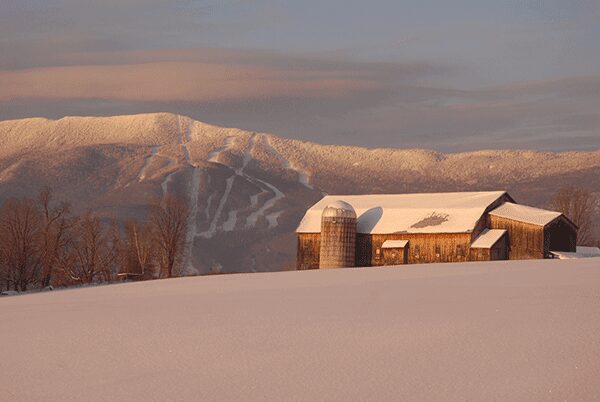A long time symbol of the beauty and productivity of the Valley’s working landscape has a new lease on life.
If you’ve ever visited the Mad River Valley or are lucky enough to live here, take a moment and conjure up an image of the iconic Bragg Farm: a beautifully weathered old barn and silo sit on a pastured hillside, while just westward, off in the distance, Sugarbush’s ski trails spill down the steep sides of the Green Mountains, framed by both trees and barn. Perched in the high hills of Fayston, and an impressive showpiece of both the beauty and productivity of the Valley’s working landscape, Bragg Farm has become a unique and potent symbol for all who know and love the Mad River Valley. No wonder that, without an ounce of hyperbole, the Preservation Trust of Vermont refers to Bragg Farm as “an unusually large dairy barn in a spectacular setting.”
Perhaps the Mad River Valley’s most photographed single property, Bragg Farm has a storied history. Purchased in the 1850s by Anna and Azro Bragg, the farm encompassed a generous 550 acres at its nineteenth-century production height, with forty dairy cows, fields for potatoes, raspberries, and strawberries, and a robust maple-sugaring operation. A half century later, Azro and Anna’s son Frank started milling local lumber to build the imposing Late Bank Barn, a project that would take him three years. He died of illness soon after completing it, and the farm was sold. Erlene and Willis Bragg obtained a smaller portion of the family farm in 1952 to operate a small dairy. In 2008, their son Reggie and his wife Dorothy put the property up for sale.
Recognizing Bragg Farm’s importance to the Mad River Valley, the Vermont Land Trust partnered with the Mad River Watershed Conservation Partnership (comprised of the Mad River Valley Planning District, the Friends of the Mad River, and the Fayston Natural Resource Committee) to purchase the property in August 2012 at its appraised value of $760,000. The conservation of Bragg Farm and its iconic barn was seen as vital by local leaders, explained Ky Koitzsch, the chair of the Fayston Natural Resources Committee; it was, he said, “a wonderful opportunity for our town to ensure a permanent link to our rich cultural heritage and to preserve the beauty of Fayston’s agricultural landscape.”
With the Bragg Farm property conserved, the Vermont Land Trust launched a public search for a new farmer with a clear vision for bringing the farm back to life. Enter Marisa Mauro. The enterprising twentysomething cheese maker and founder of Ploughgate Creamery had lost her leased farm facility in Albany, Vermont, to a devastating fire in the fall of 2011. Mauro’s Vermont Land Trust Bragg Farm application bested a dozen other proposals, and Ploughgate Creamery has now moved to the hills of Fayston, where Mauro will build her small-scale dairy to an eventual twenty Jersey cows (with suckling pigs as an added bonus); she hopes to produce 5,000 pounds of butter annually, to be sold through her existing network of buyers and chefs throughout central Vermont. “I feel the utmost gratitude toward the supporters and contributors of the Bragg Farm conservation project,” Mauro recently explained, calling Bragg Farm “the fulfillment of a lifelong dream” and a “community meeting place that everyone can enjoy.” She plans to host music and locavore events along with other public gatherings on the property in the months ahead.
Indeed, the Bragg Farm revitalization initiative is a wonderful example of the spirit of collaboration that makes Vermont’s Mad River Valley special. “The Bragg Farm conservation project is a chance to protect a place that captures the beauty and heritage of our watershed, providing new opportunities for farming to continue to thrive and diversify. We could not have done this without the support of the Vermont Housing and Conservation Board, the town of Fayston, and so many contributing businesses, residents, and visitors,” summed up Liza Walker, the Vermont Land Trust’s local director. “There is a remarkable rise in the spirit of partnership and innovation in the Valley which is linking farmers, customers, schools, and restaurants in exciting new ways.” Thanks to the generosity and vision of many Mad River Valley supporters (including Sugarbush), the now-productive Bragg Farm enters the twenty-first century with a new lease on life—good news for all of us who love this special place.

